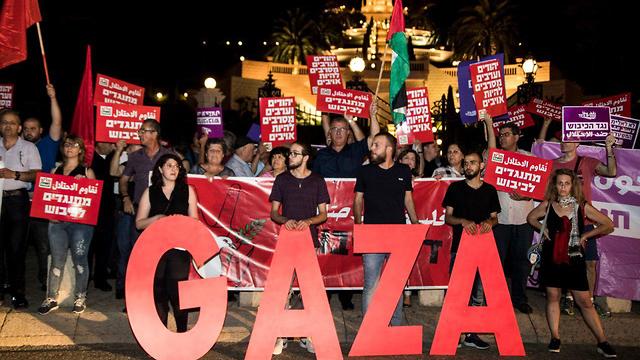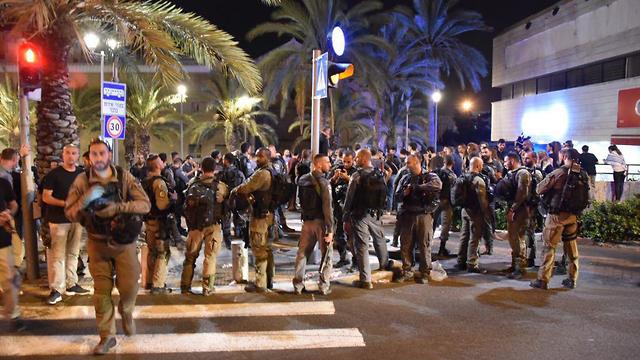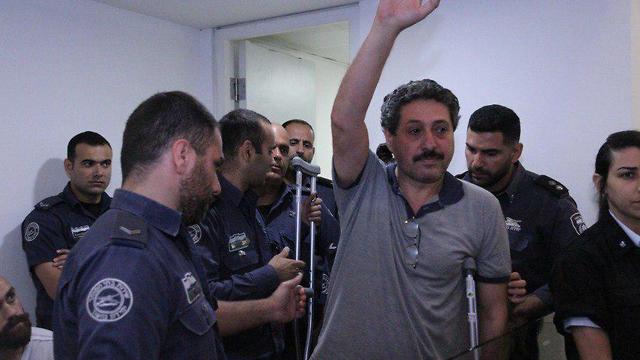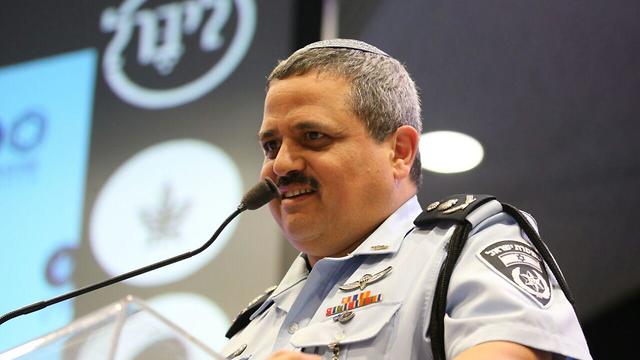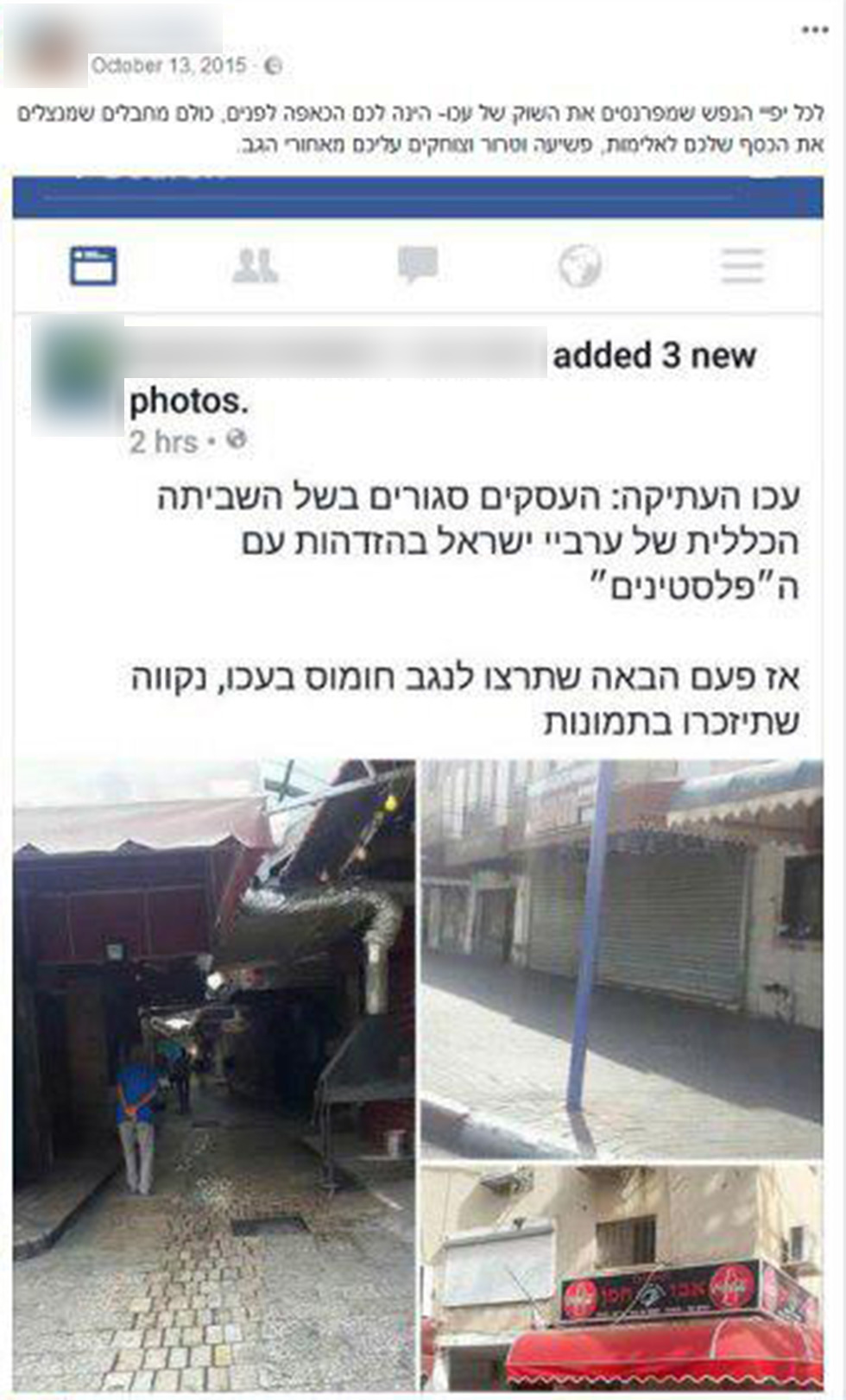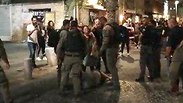
Arab organization files complaint over police brutality
Police Internal Investigations Department receives formal complaint from legal center for Arab rights alleging cops in charge of detainees arrested in pro-Palestinian protest used excessive force and acted in a racist, discriminatory and abusive manner during their arrest.
Adalah–The Legal Center for Arab Minority Rights, has accused the police of racist and discriminatory behavior following last week's arrests in Haifa during a protest in solidarity with Gaza.
In a letter sent to the Police Internal Investigations Department (PIID), the organization claimed police officers beat handcuffed detainees, prevented them from receiving medical treatment, ridiculed the medical staff treating them and even hurled raciast and derisory comments at them.
In its letter, Adalah asked the PIID to open an immediate investigation against the policemen who were stationed at the protests and the police station that evening, "in light of the harsh violence directed at those present."
The policeman suspected of attacking Jafar Farah, the director-general of the Mossawa Center that promotes the rights of Israel's Arab citizens, was interrogated once again at the PIID offices and has been removed from his post for several days while the invetigation is underway.
The letter claimed that the police treated the protest as a demonstration without a permit and therefore arrived there with reinforcements.
"Police forces surrounded the area with roadblocks, and formed a ring around the protestors, preventing them from entering or leaving the area," the letter claimed.
It then noted that none of the protesters were violent or even shouted inciting slogans. Nevertheless, it alleged, the police "decided to disperse the participants with great violence, which was manifested at first by pushing the crowd into a very narrow space, and then with the use of indiscriminate physical force against them."
Adalah asserted that "the detainees, who were handcuffed, suffered severe violence on their way to and from the police station—many of them asked for immediate medical treatment, but were denied it."
The organization went on to claim that even during their stay at the police station, where they spent the night, and until they were brought to Kishon Detention Center the following day, "the detainees were subjected to severe violence, hostile and vengeful treatment and humiliation by the police."
"Today we'll have a party, we're going to f*** you up," one officer allegedly shouted at the detainees. He, together with another, allegedly cursed, spat and shouted at their detainees incessantly and without provocation, calling them "sons of wh***s."
Citing examples corroborated by eyewitnesses, mainly people who were arrested at the protest and other fellow demonstrators, Adalah said one person filming the event had his shirt violently ripped by a policeman who threatened he will "break his arm" should he refuse to cooperate.
Together with a policeman, they pushed, cursed, spat and shouted at the detainees, it affirmed.
It then noted an alleged incident in which another detainee was lashed with plastic cuffs after requesting medical treatment, and another detainee who was hurt after riding in the back of a police cruiser whose driver ran through several red lights, only to crash into a vehicle at an intersection near the police station.
"He could not even walk but was not taken for treatment," the letter said, noting that despite his injuries he was hauled to the station and manhandled by an officer there. "He bled for two hours before they took him to a hospital. He was handcuffed during his stay in the hospital with handcuffs that left him bruised. At the doctor's request, they were removed twice but were returned immediately."
At the station, the letter noted, the detainees were "handcuffed with plastic cuffs … that were tightened in a manner that blocked the flow of blood to their hands. In some cases, when some of the detainees complained about it, policemen came and tightened them even more." The cuffs were not removed when the detainees were speaking to their lawyers, even though none of them had shown any violent tendency one way or otherwise, the statement said.
Violence and racism at the hospital
The letter went on to claim that Farah was "standing on both legs," when he entered the police car after being arrested, but left the police station hobbling."At the station, one of the policemen kicked him, without any justification, and according to X-rays and CT scans done at the hospital, which were also taken late, he suffered a compression fracture in his left leg and a suspected ruptured aorta, apparently due to severe beatings to the chest and abdomen," it detailed.
"Throughout the treatment, there were police officers who, according to the hospital staff, ridiculed and verbally abused the hospital's staff members, inter alia, with reference to the Arab and Muslim identity of some of them," the letter continued.
"Thus, for example, a nurse wearing a Hijab was told that she was 'clearly inciting everyone,' an intern who asked that Farah's cuffs be removed was told that his decision 'will be examined by a court' and, if found medically baseless, threatened the court will 'pay it back' for his transgression. Policemen than mocked him for shaking when writing his medical order to uncuff Farah."
Farah, Adalah said, remained cuffed despite medical protocols, was released early despite his doctor's opinion due to police pressure and was prevented from speaking to a lawyer.
A test of self-restraint
The police said that the officer who was interrogated by the DIP was removed for only a few days from the job "as part of the proper conduct of an investigation."
In its response, the Israel Police said that "insofar as there is concrete evidence supporting the claims (made by Adalah), they should be transferred to the PIID and not serve as a media headline without substantiation in reality." It also noted that the policeman who allegedly attacked Farah was interrogated by the PIID and removed for "only a few days" from his post "as part of the proper protocol."
Police Commissioner Roni Alsheikh, though, made a much sterner remark in response, stressing that being a policeman requires self-restraint, and that whoever is found lacking it, will find himself out of a job.
"I know that most good people ... in all sorts of positions, in a test of self-control, are unable to pass it, so we have to be careful," he said. "Self-control is one of the biggest and most complex challenges of a cop."
Alsheikh then mentioned the incident when a policeman was caught on camera beating a Palestinian truck driver, noting that he was an elite soldier in the IDF's Duvdevan commando unit and later an officer at the Israel Police Special Patrol Unit (Yasam), and calling him "the salt of the earth," but made clear he utterly failed "the test of self-control," and was therefore investigated and dismissed.
"Anyone who does not stand (the test of self-restraint)—will find himself out of the police," he reassured.
Case against accused officer bolstered over social media outbursts
While not being particularly active on social media as of late, the Facebook account of the policeman suspected of attacking Farah reveals his troubling positions regarding Israeli Arabs and Palestinians.In December 2015, he shared a post calling the Palestinians a "made up people." Two months earlier, the officer shared a picture of shuttered shops at the market of the Old City of Acre, which were closed by their Arab owners in solidarity with the Palestinians at the height of the "Knife Intifada"—a wave of lone-wolf terror attacks that lasted for months.
"To all the snowflakes who support the market in Acre—here's your slap in the face; they're all terrorists who exploit your money for violence, crime and terror and laugh at you behind your back," he wrote.
The officer's fellow policemen asked the media not to besmirch his name and wait until the investigation is complete.
"If it turns out that there was nothing, it would still be irreversible damage to the guy," said an officer and associate of the suspect. "This guy is a fighter, he was a paratrooper, and loyally served in the Yasam. His father was also a policeman and devoted his life to the police and the state. His is a good family man that does not deserve to be judged before things are fully understood."
Ahiya Raved, Yishai Porat and Itay Blumenthal contributed to this report.










